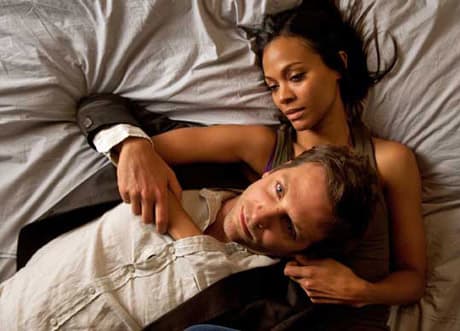Mediocre: it's something that most people are, but few will admit. It's also something that most films are. There's really nothing wrong with mediocrity. In fact, without the hordes of mediocre people doing mediocre things, society would cease to function as we know it. And without mediocre films to entertain the masses for a bit, appealing to the delusion that there's something bigger and better to strive for, they might actually stop and think for a minute, realizing their limitations, which would cause economically problematic things like introspection.
Oddly enough, The Words – a mediocre, harmless, passable film – is about the struggle with being normal and well adjusted. It's a plight that Bradley Cooper – a modern-day Steve Guttenberg – likely knows all too well, which is why his passable, milquetoast persona is the perfect candidate for the role that, like Limitless, posits him an artist that just doesn't quite have what it takes to stand out. This leads him to deception, or a falsification of abilities, much to the moral outrage of Judeo-Christian "ethics."
Here, his traditionalist take on being a writer (tortured, bohemian and weirdly unable to balance a burgeoning fall-back career) leaves him and comely girlfriend Dora (Zoe Saldana) in a state of financial distress. Finding a manuscript in a leather attaché purchased in a Parisian antique shop, he types it out on his computer, which leads to the whole "publishing of someone else's book" thing and the nature of living fiction and stealing the "words" or identity of another person.
Mixed with this storyline is a terrible flashback about a soldier and a moody French woman, as well as a slightly more palatable flash-forward of sorts with Dennis Quaid telling the story of a young man that stole and published his first novel – coincidence?
When everything comes together, it's predictable, but satisfying, reminding us mainly that mediocre films do help pass the time well. The performances are equally bland and the film itself riddled with pacing and editing errors, but there's enough gloss and well-timed sad music to generate sufficient manufactured pathos to appeal to the aforementioned target audience.
There's even a little something to think about when the didactic is spelled out word-for-word when Olivia Wilde says something about not even getting the chance to know if you're special when you steal success. And since thinking can be a pain in the ass, this helpful interjection is a kick in the pants.
(Alliance)Oddly enough, The Words – a mediocre, harmless, passable film – is about the struggle with being normal and well adjusted. It's a plight that Bradley Cooper – a modern-day Steve Guttenberg – likely knows all too well, which is why his passable, milquetoast persona is the perfect candidate for the role that, like Limitless, posits him an artist that just doesn't quite have what it takes to stand out. This leads him to deception, or a falsification of abilities, much to the moral outrage of Judeo-Christian "ethics."
Here, his traditionalist take on being a writer (tortured, bohemian and weirdly unable to balance a burgeoning fall-back career) leaves him and comely girlfriend Dora (Zoe Saldana) in a state of financial distress. Finding a manuscript in a leather attaché purchased in a Parisian antique shop, he types it out on his computer, which leads to the whole "publishing of someone else's book" thing and the nature of living fiction and stealing the "words" or identity of another person.
Mixed with this storyline is a terrible flashback about a soldier and a moody French woman, as well as a slightly more palatable flash-forward of sorts with Dennis Quaid telling the story of a young man that stole and published his first novel – coincidence?
When everything comes together, it's predictable, but satisfying, reminding us mainly that mediocre films do help pass the time well. The performances are equally bland and the film itself riddled with pacing and editing errors, but there's enough gloss and well-timed sad music to generate sufficient manufactured pathos to appeal to the aforementioned target audience.
There's even a little something to think about when the didactic is spelled out word-for-word when Olivia Wilde says something about not even getting the chance to know if you're special when you steal success. And since thinking can be a pain in the ass, this helpful interjection is a kick in the pants.




